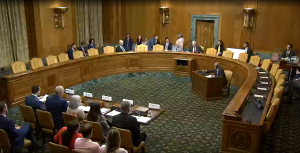
The U.S. Senate Budget Committee meeting of June 5, 2024. Courtesy, U.S. Senate
The U.S. Senate Budget Committee met last week to hold another hearing on how the climate is impacting insurance markets and rates (see our next newsletter story) but it missed the point by its ongoing focus, as we’ve chronicled here, on Florida’s state-backed Citizen Property Insurance Corporation and whether it might one day be asking for a federal bailout in the event of a catastrophic storm or storms.
One respected veteran Florida insurance industry executive wrote to me after watching the hearing, commenting that “These guys still don’t understand the problem. The threat to the federal budget is not the insured risk, it’s the un-insured risk, what Swiss Re calls the ‘protection gap.’” His argument is that flood losses are largely uninsured and the federal program has lost billions through its National Flood Insurance Program (NFIP). As the seas rise and storms dump more rainfall, those uninsured losses are only going to get worse. Personal residential earthquake risk is also largely un-insured. Losses to infrastructure owned by state and local governments are, in many cases, not insured or are under insured. Clean-up expenses after a disaster are not insured. That’s where the federal dollars go and where the attention by policymakers should be focused.
Committee Chairman Sheldon Whitehouse’s (D-Rhode Island) focus on Citizens Insurance and a recent academic report claiming that Florida’s property insurance market is full of “low quality insurers,” is misinformed and misguided. Federal dollars don’t go to pay for insolvent insurance companies. Those losses are paid for by the state guarantee funds. Why didn’t anyone talk about that? Oklahoma Insurance Commissioner Glen Mulready, one of five witnesses who testified at the hearing, tried to explain how state regulators ignore the rating agencies when determining each insurance company’s financial stability, but his points didn’t seem to hit home with Whitehouse or some other Senators.
Another witness, from the same academic community that brought us the previous report, sought to connect the potential impact of insolvent insurance companies on a federal government-sponsored enterprise (GSE), such as mortgage backers Fannie Mae and Freddie Mac. Dr. Ishita Sen, Assistant Finance Professor at the Harvard Business School made a big deal about that and I think it would have been pretty easy to poke holes in her argument. Has Fannie or Freddie ever lost money on a mortgage because of a hurricane or severe convective storm? I don’t think anyone did a good job of pointing out the difference between the financial crisis of 2008 – which involved collateralized mortgages (that in many cases were insured by AIG, which needed federal help) – and the impact of an insolvent insurance company on the GSE’s.
Despite the efforts of yours truly and many industry leaders (including our newsletter readers here), it’s clear that Florida needs a better spokesperson for its insurance market. Among the points that need to be made:
- The average homeowners insurance premium in Florida is $3,600 not $6,000 (according to the Florida Office of Insurance Regulation (OIR) market update on May 17);
- More than 60% of the increase in homeowners insurance premium in the last five years is the result of the increased cost of rebuilding (i.e. inflation);
- Citizens Insurance and the Florida Hurricane Catastrophe Fund will be able to pay their bills without calling on the federal government; and
- Rates in Florida for homeowners insurance are going down, not up. We can’t say the same for auto insurance which, as Senator Grassley pointed out, are not affected by climate change.
Please read more about what was said at the hearing in our next newsletter story and then click here to watch or listen to the hearing for yourself.

